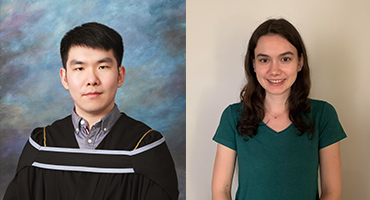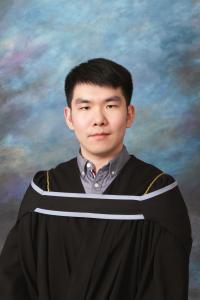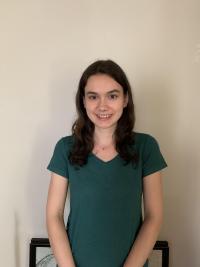Tom Hou and Taylor-Lynn Swift-Lapointe receive top PHAS undergraduate student awards

Congratulations to Tom Hou and Taylor-Lynn Swift-Lapointe, who have received the top departmental student awards - the Rudi Haering Medal in Physics and the Arthur Crooker Prize - respectively. The Rudi Haering Medal is established by friends, colleagues, and former students of Dr. Rudi Haering, and recognizes the top student in the graduating class. The Arthur Crooker Prize has been endowed by friends and former graduate students of Dr. Arthur Crooker; it awards a third- or fourth-year student who shows the most aptitude for experimental physics.
"I feel honored to receive this year end award. It is a great affirmation for the past four years of study and encouragement for my future research in Chemical Physics," said Tom. He just graduated (Combined Honours in Physics and Chemistry), and will be starting his PhD program in theoretical chemistry at UC Berkeley. "I’m planning to study in the field of exciton transport, which I became interested in during my final year thesis."
Taylor-Lynn also graduated this year (Honours in Physics), and will begin her MSc in Physics at UBC with Dr. Shannon Kolind in MRI research in September. She noted that her most memorable experiment was the one about nuclear magnetic resonance (NMR) in the PHYS409 lab, which gave her a solid foundation for her future research work.
"The UBC Department of Physics and Astronomy has a dynamic faculty of top-class researchers," said Taylor-Lynn. "There are many research areas, providing diverse opportunities for students to explore and get involved. I am thankful for the opportunities I have received, and I am grateful for the encouragement and inspiration always provided by my professors."
Both recipients have also shared below why they decided to go into physics, and a few tips for current PHAS students. Congratulations again both!
Tom Hou

Why did you choose to go into physics for your undergraduate degree program?
My initial motivation for pursuing a major in Chemical Physics lies in my curiosity about the principles behind nature. I was very interested in chemistry and biology in high school, and fascinated by the chemical reactions in our bodies. After the first year in UBC, I felt that physics is indispensable if we want to understand those chemical or biological mechanisms deeper. In addition, physics has its unique beauty of being abstract but simple. A single differential equation can not only model the ripples in water, but also light from the sun. So, based on my initial motivation and new understanding of physics in the first year, I chose chemical physics as my major.
What was your most memorable moment as a PHAS student?
To be honest, there are lots of memorable moments as a PHAS student: learning a strange effect in quantum mechanics, figuring out how to solve a homework problem, and finishing the first simulation code…If I have to choose one, I would say it is the moment when I finally completed the quantum transport simulation for my final year project (CHEM449 with Dr. Roman Krems). My previous research experiences lay in experimental physical chemistry, so this project was my first attempt for theoretical study. Thanks to my strong background as a PHAS student, I have been able to adapt to the research quickly and to work on the project independently. The moment that everything worked is one of the most memorable moments in the past four years.
Do you have any tips for current/future PHAS students?
For an undergraduate, knowing your interests and passion might be the most important thing in the 4/5 years. Don’t be afraid to try new things and stretch your ability. UBC provides us many opportunities to explore in both academia and industry. If you want to stay in academia, talk with professors and work in different labs. If you want to go to industry, seek good internships and learn the required techniques. The most important thing is not to be afraid of failures! Don’t take success in either science or your personal life for granted.
Anything else in particular you would like me to mention?
I want to thank the physics department for providing us a broad range of courses and a flexible course selection schedule. I was able to learn about interdisciplinary fields such as quantum materials and computational chemistry, and at the same time to become familiar with both experimental and theoretical research. I also want to thank our department for various scholarships. They are really an encouragement for me to think big and achieve higher goals.
Taylor-Lynn Swift-Lapointe

Why did you choose to go into physics for your undergraduate degree program?
Throughout high school, I developed an interest and passion for science, especially problem-solving in math and physics. Physics is the basis and foundation of many fields of science, with applications in medicine, astronomy, engineering, chemistry, etc. I knew that a physics undergraduate degree would give me many opportunities to explore.
What was your most memorable experiment (or research) that you have done?
During the Phys409 lab, I had the opportunity to learn about nuclear magnetic resonance (NMR) and write code for simulations of how magnetic moments behave in different external magnetic fields. Even though the lab was online and we weren’t able to use the equipment or collect experimental data ourselves, I still learned a lot; the simulations really helped me understand why the signals behave the way they do. I found this lab especially useful because I chose to do my Honours Thesis project with Dr. Shannon Kolind in magnetic resonance imaging. NMR is the basis of MRI theory, so my experience in Phys409 gave me a solid foundation I could build on as I delved deeper into MRI.
Do you have any tips for current/future PHAS students?
Go to office hours, with both TAs and profs! I remember being hesitant in first year, because I wasn’t quite sure what questions to ask. I worried that I would waste the professor’s valuable time. But throughout my degree, attending office hours became essential. It’s a chance to ask questions about lecture and homework in a smaller group, sometimes even one-on-one with a TA or prof. There are always other students struggling with the same material, so you get the chance to work with classmates, which may not be possible during large lectures. TAs can also be super helpful, as they can explain the material from a different perspective. They took the same (or similar) courses not that long ago, so they know what it is like to be an undergrad!